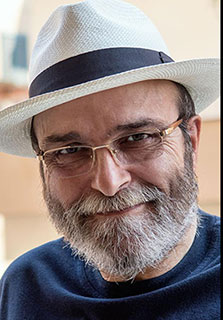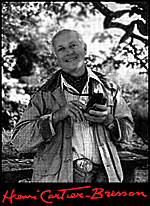|
|
|
I'll never forget the first feelings I felt in the darkroom when I saw my first photo slowly appearing from the development, almost magically. I couldn't have a camera, so ten of my schoolmates and I used the same one, a Soviet camera, Smena 8. I was 23 when I bought my first reflex, the Yashica FR, an excellent manual camera, which is still working; then I bought my first enlarger, the UPA 5, a Soviet 8x automatic enlarger. Now my equipment is more prestigious (Contax RTS II, Contax 139, Leica with original lens) but, I think, when you're charmed by photography, you can express yourself by the meaning of each kind of camera: it's pleasant to look at it and to observe all those view-finder frames, with your forefinger ready to release, so immortalizing the scene. I've always loved this art. Above all I love B&W photos; I've always been charmed by portraits and I
I'm charmed by landscapes. I like strong colours and the sharpness of details. I think composition of images is very important, if possible; I can obtain it only using my tripod and, generally, in my darkroom, when printing my photos. I also like graphic, design and music. When I decided to build my web-site up. first of all I had to accept the idea to put photos different from the originals on line. The images I proposed are a compromise between quality, which has to be acceptable, and the downloading speed of images, usually J-PEG files.
As you can easily understand, I had to compress my photos, cutting their Kb short, otherwise the downloading would be so slow that you couldn't either see one of them and you'd rightly go to other sites.
Interview by Barbara Tampieri
Do you prefer using a traditional camera or a digital one? At the moment I prefer using a Contax equipped with a Carl Zeiss 50/1.7. I am fascinated by the evolutions of technology. I read much and love everything related to photography. I have been developping and printing my films all my life, in the traditional way. I am interested in the new technologies because I find their versatility fascinating. In spite of my pedantry and great care for cleanliness in my dark-room there may always be some dust grain on the film and so you have to retouch it. To look at an image developping in front of your eyes is a unique emotion, it is like watching your little daughter grow.
Which are the pros and cons of using a digital camera? I don't use the digital camera but I can reply to your question. The pros are the great versatility, the cons are the costs if you choose a very high quality equipment.
Which are the pros and cons of using a reflex? The biggest pro of using a reflex is the possibility of watching through the optical lenses. This is a big advantage Barbara, especially when you use lenses other than the standard 50mm. For me it is impossible to conceive macro photography without using the reflex. One of the disadvantages of using the reflex is the noise it makes and this can be bothering if you shoot inside a church or a theater where you need silence. Another problem is the vibrations made by the mirror during the shot and if you need a long exposition or are shooting free hand this can be bothering too.
Do you elaborate and retouch your photos, and if so, which programs do you use? There is an enormous advantage in elaborating and retouching a photo with the computer. I use mainly Photoshop for cropping and final composition of the image but I use it also for retouching possible film defects. I use a 2700dpi film scanner but I also have a flat one. When I scan films I can avoid printing them.
How do you feel working with pixels instead of films is affecting traditional photography? They are welcome, my friend! There are digital equipments with an amazing resolution. The problem is if you want the best quality in digital cameras, lenses, printers and inks you have to pay a price which is at present still quite high.
Do you look for a certain effect and atmosphere or may they just be the result of a casual process? I don't think anything is causal in photography. You know what you are looking for when you are shooting a photo. Photography is mastery on light, it is taste for composition and also the developping of a certain idea. There can be casuality but it is rare and it doesn't depend either on the artist or the professional.
Do you have a favorite subject (humans, nature, abstract)? As you can see from my B/W series I love portraits. I try to familiarize with the subject - my philosophy being "the eyes are the soul", I talk to him, I let him handle my reflex. He has to accept me and understand I will never prevail on him. Only at that time he will get to know me and my reflex are a single unity and he will become part of that world.
What is your attitude towards Black and White photography? I love it. It is my first love, the one you never forget. How could I forget the emotions I felt when I developped my first film? A good B/W film, which was correctly developped, fixed and cleaned is for life. Chemical color films do not last so long. Look at you old B/W photos, they look a bit yellowed but they are almost perfect. Now look at your color photos shot 20 years ago. They lost all their colors but cyan and red. They lost their lives...
Which photographers did inspire you? I would say Henri Cartier-Bresson above all and Ansel Adams. As you see I named two masters of B/W photography as my main influence. I would say Cartier-Bresson for the human element and Adams for his technical mastery in B/W. His zone system is still adopted by all those who want to master B/W landscape technique.
Can photography as a means of artistic expression offer more than painting, illustration, etc.? I don't really know, my friend. I have been drawins since I was able to hold a pencil. When I was a little boy I used to go to the countryside to find the clay I then modeled. I painted a portrait of my mother when I caught her sleeping on a chair. At 14 I fell in love with photography. I always looked at photography as an artistic means of expression, like painting and drawing. Some years ago I used the pyrograph - you know the instrument you use to draw on wood, for my drawings. I won the first prize in an international art contest in Acireale in 1987. For me there is no particular form of art prevailing on the others, everything is natural for me. Art is art, like music is music. Rock, metal, fusion, jazz, classic, newage...
What do you want to communicate with your photos? My soul. but I do it not only with the photos but with my drawings, graphics and music. I try to evoke sensations, emotions, good vibrations. This is how I feel myself creating, and when I can communicate it to the others I am happy, I have reached my goal. Today a photography amateur signed my guestbook and wrote: "Dear Nico, your B/W photos did impress me. I hadn't felt like this in years. I have learnt more about B/W watching your great photos than looking at a hundred boring photography magazines." So he caught the message too.
Thanks Nico! Thanks Barbara. |
|
|



